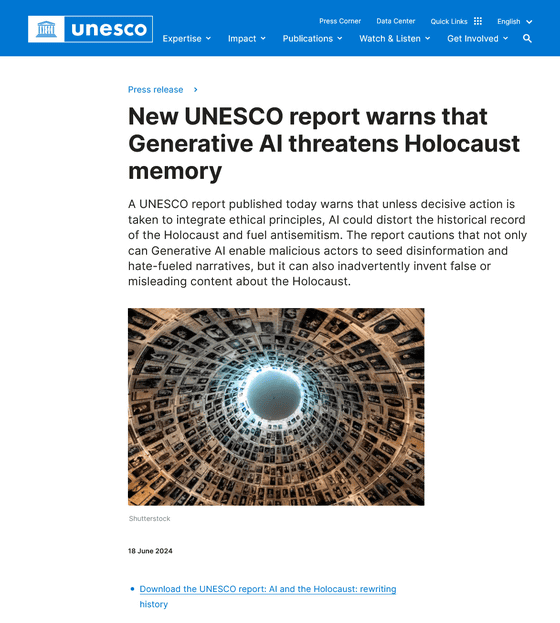UNESCO warns that AI could distort the historical record of the Holocaust and incite anti-Semitism

The United Nations Educational, Scientific and Cultural Organization (UNESCO) has issued a warning report stating that the increasingly widespread use of AI is making it harder to preserve records relating to
AI and the Holocaust: rewriting history? The impact of artificial intelligence on understanding the Holocaust - UNESCO Digital Library
https://unesdoc.unesco.org/ark:/48223/pf0000390211

New UNESCO report warns that Generative AI threatens Holocaust memory | UNESCO

In the report, UNESCO lists five main concerns:
1: AI-generated content could falsify facts about the Holocaust
AI models can generate misleading content about the Holocaust, especially when biases or gaps in the data lead to 'hallucinations,' which can lead to false or fabricated content that does not appear to have occurred in the past.
Without AI literacy and investigative skills, people will not be able to verify whether content is AI-generated or not, or recognize the unreliability of the data.
2: Deepfake technology used to falsify historical evidence
Deepfake technology could be used to manipulate audio and video to fabricate Holocaust-related content.
We need mechanisms to prevent AI from being misused to intentionally create false “evidence” that undermines the established historical record about the Holocaust and spreads hate speech.
Deepfakes of celebrities have been used to spread Nazi ideology and simulate conversations with Nazi leaders, including Adolf Hitler.
3. Manipulating AI models can spread hate speech
Targeted campaigns by violent extremist online groups could exploit flaws in AI to spread hate speech and anti-Semitic content about the Holocaust.
Chatbots and search engines have been hacked or manipulated by malicious actors to spread Nazi ideology.
4. Algorithmic bias spreads Holocaust denial
Biased data sets have led some search engines and AI chatbots to downplay the facts of the Holocaust or promote far-right content, including Holocaust denial.
5. Simplifying history
AI tends to focus on the most well-known aspects of the Holocaust, oversimplifying its complexities.
The omission of lesser known episodes and events in the history of the Holocaust reinforces stereotypical representations of the Holocaust and limits understanding of a complex past whose legacy continues to impact all parts of the world and affects people in all countries of Europe and North Africa.
While there are benefits to be gained from AI technologies in education and research, it is essential that AI designers, policymakers, educators, and researchers work closely together to overcome these challenges and harness the benefits. Only AI systems with strong safeguards and human rights assessments, coupled with an increased focus on improving digital literacy skills, can protect the integrity of historical truth and ensure the responsible use of AI.
Audrey Azoulay , Director of UNESCO and former French Minister of Culture, said: 'If we allow the irresponsible use of AI to downplay, distort or falsify the horrific facts of the Holocaust, we risk an explosion of anti-Semitism and a loss of understanding of the causes and consequences of the atrocities of the Holocaust. UNESCO's recommendations on AI ethics are urgently needed to ensure that younger generations grow up knowing the facts, not fabrications.'
Related Posts:







